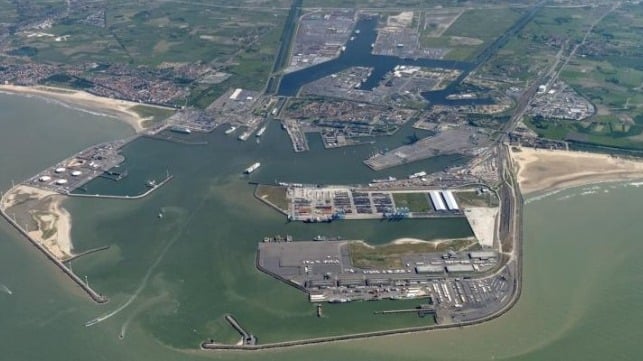Belgium’s Antwerp and Zeebrugge Seaports Agree to Merge Operations

Belgium’s two large ocean ports announced that they will merge their operations to strengthened their position and prepare for future developments. The cities of Antwerp and Bruges will begin a unification process that is expected to take a year to finalize to unite the management of the industrial ports of Antwerp and Zeebrugge making them more resilient to future challenges.
The combined operations of the two ports will have an annual throughput of more than 278 million tons becoming one of the largest breakbulk and ro-ro ports in Europe. In 2020, the ports combined handled nearly 14 million TEU, which amounted to 157 million tons of container cargo, and they accounted for 15 percent of liquid natural gas transited in Europe.
The concept of merging the two ports had been proposed several times in the past but blocked by political opposition and the fears that the smaller Zeebrugge would be eclipsed by Antwerp. In 2018, the Belgium and Dutch ports straddling the northern border merged their operations creating the North Sea Port and providing a model for the consolidation of Antwerp and Zeebrugge. Discussions for the merger had gained momentum late in 2019 but were delayed by the pandemic.
“By joining forces, we are on the way to becoming Europe's global port, while at the same time reinforcing our position as the most important container port in terms of tonnage, a solid RoRo port, and one of the largest breakbulk ports in Europe,” said Annick De Ridder, port alderman and chair of the board of directors of the Antwerp Port Authority. “Our ambition to bring the two ports together is about much more than simply tonnage and TEUs. It will enable us to focus even more firmly on the transition towards a low-carbon economy and to continue our efforts regarding the digitalization of the supply chain. The ports of Zeebrugge and Antwerp are to a large extent complementary and working together will make us more resilient to external challenges.”
Detailing their strategy for the combination in a press briefing, the two ports emphasized that their operations are largely complementary. Antwerp specializes in the handling and storage of containers, breakbulk and chemical products, while Zeebrugge is a major port for RoRo traffic, handles containers, and the transshipment of liquid natural gas. Working together they said will make it possible to consolidate sustainable growth, not only of each port's market share but also the joint market share of the combined operation.
To maximize the added value of a unified port, the Port of Antwerp-Bruges as it will now be known will seek to develop and make optimum use of the interconnectivity between the two ports. The transportation of goods by rail between the two sites will be bundled, estuary traffic by inland vessels on the North Sea will be optimized, and pipeline connections will also be on the list of priorities.
Committed strategic investments, such as the new sea lock in Zeebrugge and the additional container capacity in Antwerp, will go ahead. Future investments will be evaluated from a unified operational perspective so that both port platforms will benefit, and the port continues to meet its customers' expectations.

that matters most
Get the latest maritime news delivered to your inbox daily.
As part of a joint plan, the two ports have defined three strategic priorities – sustainable growth, resilience, and leadership in the energy and digital transition – for their future priorities. Focusing on sustainability and the ongoing transition in the industrial and maritime sectors, they will look to position the combined port as a hub for green hydrogen and the coming hydrogen economy. They believe the area with its industrial cluster in the Antwerp-Zeebrugge will play a key role in the future energy challenges in the Flanders region and the broader Benelux area. They will also continue their efforts to examine will examine methods of applying CCUS (Carbon Capture, Utilization & Storage) to contribute to the transition towards a low-carbon port.
The transaction is subject to a number of customary conditions, including approval from the Belgian Competition Authorities. Both parties aim to finalize the transaction in 2021.
